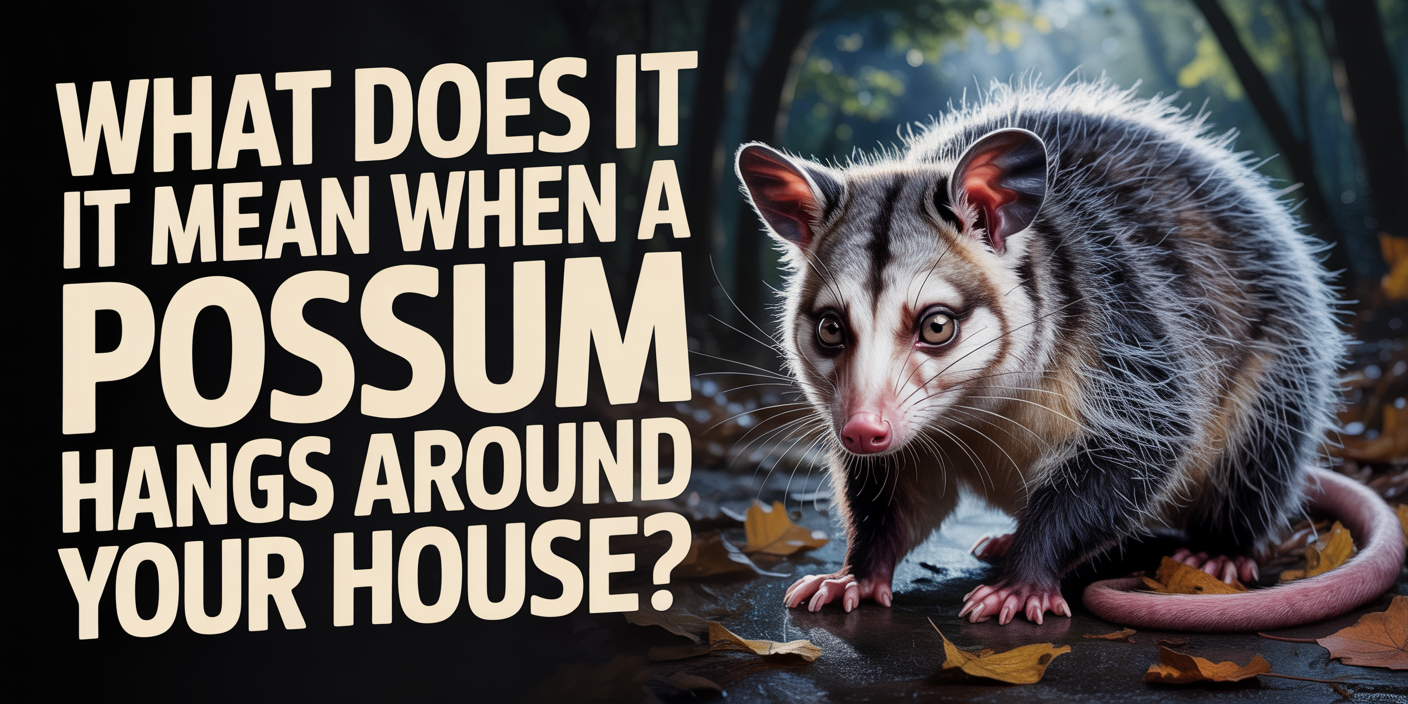“When a possum keeps circling your home, it’s sending a clear signal: your property feels safe, offers quick snacks, and has a cozy spot to nest. This opportunistic guest is sizing up the place and deciding if it should move in permanently. Remove the food and block the hiding spots, and the possum will wander off to an easier target.”
If you’ve noticed a possum waddling around your yard night after night, sniffing near the porch or rummaging by your garbage bins, you’re not alone—especially if you live on Florida’s Treasure Coast. Between the warm climate, lush tree cover, and easy food sources, our neighborhoods are like five-star resorts for local wildlife. And possums? They’re opportunists. When they hang around your house, they’re not trying to be creepy—they’re just looking for a cozy crash pad with snacks on the side. That’s when AAAC Wildlife Removal steps in for expert possum control.
Still, just because a possum isn’t aggressive doesn’t mean it’s welcome. Repeated visits can mean they’ve found something they like on your property, whether it’s shelter, food, or a nesting site. That’s when you need to understand what they’re up to, what might be attracting them, and how to keep them from becoming full-time residents. Let’s break down what it really means when a possum won’t leave—and what you can do about it before it turns into a bigger problem with the help of our possum control services.
Learn more: What does it mean when a possum is around your house?
It’s All About Opportunity: Why Possums Are Attracted to Your House
Possums don’t just wander onto your property for no reason. These nocturnal marsupials are highly opportunistic, and they’ve got a sharp nose for easy meals. Unsealed trash bins, outdoor pet food, and fallen fruit all attract opossums looking for a quick snack. Compost piles, bird feeders, and barbecue scraps only add to the buffet and increase the chances of seeing opossums in your yard night after night.
Beyond food, your property may also offer ideal shelter. Possums love dark, quiet spaces like crawlspaces, attics, woodpiles, or under low decks—especially in warm, lush environments like the Treasure Coast. If you’re not careful, your home can become an accidental invitation for them to settle in. To get rid of possums for good, it’s essential to eliminate the things that draw them in before they decide to take up residence.
Common Signs a Possum Has Moved In (Or Plans To)
- Nighttime Noises That Don’t Add Up- One of the first red flags is hearing sounds when the rest of the house is quiet. Possums are nocturnal and tend to move around attics, rooftops, and decks once the sun goes down. Scratching, thumping, or rustling above your ceiling or outside your window can be a dead giveaway.
- Trash Trouble and Scattered Debris- If your garbage cans are mysteriously knocked over in the morning or you’re seeing food remnants scattered around, a possum could be the culprit. These critters are drawn to easy food sources and won’t hesitate to dig through loose lids or open bins. Pet food left outside is another favorite target.
- Droppings, Tracks, and Other Messy Clues- Possums leave behind more than just a mess—they leave evidence. You might spot small, tubular droppings near fences or under porches. Look for muddy footprints near entry points or smudges on low walls or siding where they’ve climbed. These subtle signs can indicate they’re not just passing through—they’re making plans.
- Use a Motion Camera to Confirm- If you’re unsure what’s been creeping around after dark, a motion-activated camera is your best friend. It can help you determine if it’s really a possum or another nighttime visitor like a raccoon, armadillo, or feral cat. Plus, having footage helps wildlife professionals understand what they’re dealing with when it’s time to intervene.
Should You Be Worried? Here’s What Possums Can Do
1. Are Possums Dangerous to People or Pets?
Possums generally aren’t aggressive, but that doesn’t mean they’re harmless. If cornered or startled, they might hiss, bare their teeth, or even play dead to avoid confrontation. While rare, there’s still a small risk of scratches or bites, especially if a curious child or pet gets too close. Despite popular myths, opossum behavior makes them unlikely carriers of rabies, but caution is always smart.
2. Do Possums Carry Diseases or Parasites?
Yes, possums can carry diseases like leptospirosis, salmonella, and tuberculosis, along with external parasites such as fleas, ticks, and mites. Even though the likelihood of catching rabies from an opossum is extremely low, their droppings and fur can still pose a nuisance for people and pets. A buildup of waste or prolonged presence raises the risk of contamination, especially in enclosed spaces like attics or sheds.
3. Will They Damage Property or Landscaping?
While opossums do help the environment by eating pests like insects, slugs, and even small rodents, their constant foraging can become destructive. They often root through mulch beds, dig shallow holes, or knock over plants and trash bins. If opossums hanging around your yard find shelter in your attic or crawlspace, they may cause costly damage to insulation, wiring, or HVAC systems—all in the name of finding a place to call home.
How Long Will a Possum Stick Around?
Not every possum sighting means trouble. Some are just passing through, especially if they’re sniffing around for a quick snack like unsecured trash or leftover pet food. But when a possum keeps coming back—or worse, starts nesting in your attic, crawlspace, or under the deck—it likely sees your home as a safe, resource-rich environment worth settling into.
Timing also plays a role. On the Treasure Coast, possum activity tends to spike during mating season, which runs from February through July. During this period, females search for quiet, protected spots to give birth and raise their young. That means if you’re seeing frequent visits, especially at night, there could be a mother nearby or even a den already established on your property.
While some possums will eventually move on if the food and shelter disappear, many won’t leave without encouragement—especially if they’ve made themselves comfortable. And because Florida has specific wildlife regulations around trapping and relocation, it’s often safer and smarter to call a licensed wildlife control expert to handle the situation humanely and legally.
What to Do If a Possum Keeps Visiting Your Home
Eliminate Food, Water, and Shelter Sources
Possums return to places that offer easy access to resources. Start by sealing your trash bins tightly, bringing pet food indoors at night, and cleaning up fallen fruit or birdseed. If you compost, make sure your pile is secured and covered so it doesn’t turn into a possum buffet.
Close Off Entry Points and Hiding Spots
Walk around your home and look for low or hidden areas where a possum might sneak in. Seal crawlspace vents, patch gaps near the roofline, and close off access under decks or sheds. Trim tree limbs that touch your roof—possums are expert climbers and can use branches as bridges to your attic.
Use Gentle Deterrents
Motion-activated lights, sprinklers, or even placing a dog or cat bowl inside at night can make your space less appealing. Possums don’t like sudden movement, loud sounds, or unfamiliar smells, so these small steps can go a long way in keeping them away from your home.
Call a Licensed Wildlife Removal Pro
If the possum keeps coming back or you suspect it’s nesting on your property, it’s time to call in the experts. AAAC Wildlife Removal of Treasure Coast specializes in humane trapping, removal, and exclusion services. We don’t just remove the animal—we help make sure it doesn’t come back by securing your home and offering long-term prevention solutions.
Why Possums Are Common on Florida’s Treasure Coast
The Treasure Coast is a hotspot for wildlife thanks to its warm, humid climate and abundant natural cover. Possums, in particular, thrive here because the environment offers everything they need: food, water, and year-round shelter. Suburban homes that border wooded areas, canals, or parks provide easy access to both nature and human convenience—making your backyard especially attractive to a wandering possum.
Cities like Port St. Lucie, Fort Pierce, and Vero Beach often see increased possum activity due to the mix of residential landscaping and nearby green spaces. Fruit trees, compost piles, and even outdoor grills give these animals all the incentive they need to linger. Without proper deterrents or wildlife-proofing, it’s easy for possums to settle in and start treating your property as home base.
Why Possums Are Common on Florida’s Treasure Coast
The Treasure Coast is a hotspot for wildlife thanks to its warm, humid climate and abundant natural cover. Possums, in particular, thrive here because the environment offers everything they need: food, water, and year-round shelter. Suburban homes that border wooded areas, canals, or parks provide easy access to both nature and human convenience—making your backyard especially attractive to a wandering possum.
Cities like Port St. Lucie, Fort Pierce, and Vero Beach often see increased possum activity due to the mix of residential landscaping and nearby green spaces. Fruit trees, compost piles, and even outdoor grills give these animals all the incentive they need to linger. Without proper deterrents or wildlife-proofing, it’s easy for possums to settle in and start treating your property as home base.
Final Thoughts: Don’t Wait—Take Control of the Possum Problem
When an opossum keeps hanging around your home, it’s more than just a weird coincidence. It’s a sign that your property is offering something they want—usually food, shelter, or a safe place to take up residence. While an opossum in your house may not seem like a big deal at first, ignoring the issue can quickly lead to health concerns, structural damage, and the need for serious pest control.
The good news? You don’t have to handle it alone. With a few smart prevention steps and help from AAAC Wildlife Removal of Treasure Coast—a trusted team for local wildlife removal—you can reclaim your space and keep your home safe. Don’t wait until the scratching in your attic gets worse. Call now and let us help you send that opossum packing, the humane and effective way.




